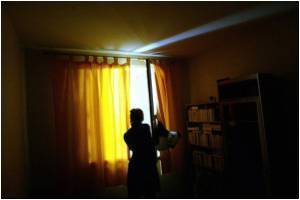Visitors from coming to stay at his small B&B in Hebron's Old City have not put off Mohammed Saadeq, who has had rocks, bleach and even dead rats thrown at his home.

But since the tiny bed-and-breakfast opened its doors just two months ago, its two rooms have been fully booked, bringing the Saadeq family a welcome source of income in an area where 76 percent of the population live under the poverty line.
Like hundreds of Palestinians in H2, Saadeq's closest neighbours are settlers who live in the Avraham Avinu settlement, which faces directly onto his one-storey home and overlooks the narrow alleys where the souk is located.
And for those not used to the bizarre reality of life in the shadow of a settlement, a walk through the market can prove enlightening.
"About a week ago, they threw down two dead rats and we had to contact the authorities to come and take them away," says shopkeeper Jamal Maraga, pointing up at the houses above the market.
"I've been working here since the 1980s and I've seen them throw dirty water, bleach and urine, but that was a first," he says.
Advertisement
And the relationship between the settlers and their Palestinian neighbours living across the alleyway is no better.
Advertisement
The dogs roam freely across the open-plan rooftops at night, and their Jewish neighbours shout obscenities in Arabic, says Kneibi, who is six months pregnant.
As she talks, her two-year-old son drops a half-chewed bagel onto the soiled floor, his mother snatching it out of his hand before he can put it back into his mouth.
The walls around the rooftop are perilously low, but building work or renovations are political issues in H2, with Saadeq saying he cannot make them any higher because of an Israeli military order banning such work on "security grounds."
The military presence took on an even harsher twist inside the building three years ago, when troops sealed off four rooms, including one containing furniture and clothes, because they overlooked the settlement.
For three months, the family was unable to access any of the rooms and had to rely on furniture and clothes donated by the International Committee of the Red Cross, until Saadeq decided enough was enough.
"Finally I opened the rooms but the settlers complained and the army arrested me," he told AFP, saying he spent four days in jail on charges of using the rooms without the army's permission.
Finally, after a lengthy legal battle, the family were given permission to use the rooms they now live in, although the windows are boxed in with a closely knit criss-cross of metal.
Opening up the rooms for the family to live in freed up the remaining space, which was renovated by the Hebron Rehabilitation Committee and turned into two neatly turned out guest rooms.
"It's a start for us, but we are optimistic," Saadeq says, handing out business cards for his fledgling business, which still doesn't have a name.
Despite the hardships, opening the business with the help of a Red Cross income-generating programme, has made a huge difference financially.
So far, Saadeq has had a steady stream of visitors including a Swedish couple, an elderly Palestinian expatriate who lives in Cairo and a couple of Israelis working with Peace Now.
Each visitor paid between 50-150 shekels ($15-$42/10-30 euros) per night for half-board.
And Saadeq earns a bit of extra money by selling CDs of a film about life in H2, a 4.3 square kilometre (1.7 square mile) area where Palestinians are not allowed to drive and in some cases not even allowed to walk along streets where they live.
This area, once the thriving heart of Hebron, is now a ghost town. More than 1,800 shops have closed down, mostly due to Israeli restrictions on movement, while others have been sealed shut by military order.
For Saadeq, the surreal reality that is Hebron's H2 offers an unusual way to eke out a living -- and it is a reality that does not look set to change any time soon.
Source-AFP








